Digital Warfare: The Future of Cyber Threats in the Twenty-first Century
How does hacking and influencing work out in cyberspace? How has Stuxnet - the world's first cyberweapon - changed the way of warfare? What are the psychological effects of having an invisible enemy, and what are future developments?

The Internet has become more important than ever. Digital communication (and IT) is deeply woven into our society, ranging from the financial sector to the operations of our healthcare system. Apart from its virtues for economy and mankind, increasing dependence on its functioning comes with vulnerabilities. Even ‘small’ failures have an enormous impact on the economic, political, and social stability of our world. Therefore, numerous countries have started to develop responses, including military, to possible cyber-attacks. Instead of workouts in the mud, soldiers of tomorrow are trained to fight in the depths of cyberspace.
Coordinator
Prof. dr. P.A.L. Ducheine
Timetable
You can find the timetable on Datanose.
Entry requirements
The course Digital Warfare: the future of cyberthreats in the twenty-first century is open to second- and third-year bachelor students.
Registration
UvA Bachelor's students can register from 2 to 9 December 2024 in the GLASS registration rounds. Master’s students can send a short motivation to keuzeonderwijs-iis@uva.nl.
‘Bijvak’ students can register from 2 December 2024 until one week prior to the start of the course, by completing the online registration form.
If you have any trouble while registering, please contact us at keuzeonderwijs-iis@uva.nl.
Costs
Prices can be found on the IIS website.
SDGs in education
The IIS strives to reflect current societal issues and challenges in our elective courses, honours modules and degree programmes and attempts to integrate the following Sustainable Development Goals (SDGs) in this course. For more information about these goals, please visit the SDGs website.

- Mode
- Open UvA Course
- Credits
- 6 ECTS,
- Language of instruction
- English
- Conditions for admission
- Open
- Starts in
- February